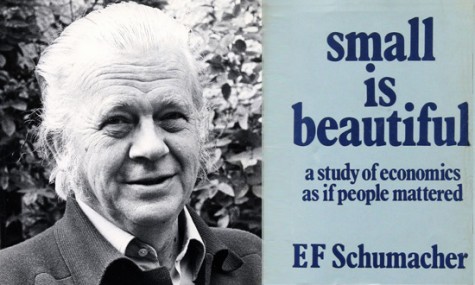Modern Economics has undermined People, Civility, Trust, Moral Sentiments, Community, Mother Nature, Beauty, and Humanity
Do you think this typical mainstream economist can have anything to say about Who We Are and What is the Purpose of this Journey We Call Life?

Economics has long been the domain of the privileged few, the so-called ivory tower, where specialised, jargonised language with opaque and impossible to understand theorems has made it inaccessible to people, the people that it claims the economics is for!!
The separation of people from economics is nothing short of scandelous and sinful, an offence against morality and humanity, resulting in the corruption of values and the exploitation of people and nature.
Modern thinking has failed us. We need the wisdom of those before us.

Photo credit: Illustration by Jon Berkerly
To my mind, given all we see, all we feel, we now know that today's dominant framework of neoliberal economics is no longer fit for purpose.
Today economics needs a different story, a relevant narrative, and new storytellers, proposing a revision of the standard framework to address issues such as rising inequality, poverty, global warming, degradation of mother nature, and social polarisation, to name but a few.
Small is Beautiful was the slim but mighty, powerful and meaningful volume, written by E.F. Schumacher in 1972. ‘Wisdom demands a new orientation of science and technology toward the organic, the gentle, the elegant and beautiful,’ wrote Schumacher. A book of wisdom, easy to read, understand and comprehend by all. He encouraged his readers to reimagine economics ‘as if people mattered’. In an age that has valorised endless expansion, he uplifted the values of humility, modesty and community. Yes, economics ‘as if people mattered,’ the value that modern economics has so spectacularly failed to deliver.
I look forward to a day when students of economics and their teachers are required to study creativity and be inspired by the work of artists, poets, mystics, musicians, sculptors, philosophers, and peacemakers, and thus, bring meaning and purpose into the study of economics. I dream of a time when economic textbooks, as well as addressing how we may manage the economy, would also speak of the need for beauty, intimacy, kindness, empathy, cooperation, enoughness, friendship, fairness, community and love, on who and what we are.
All in all, I look forward to the day when economics becomes a subject of beauty, kindness, and elegance, becoming the ‘people’s economics’, enabling and empowering us to hope, dream, and reimagine a better life and a better world. Carpe diem!
This Blog is an invitation to my fellow academic economists to reclaim economics once again, as a subject of beauty, wisdom, elegance, moral sentiments, empathy, whilst respecting all aspects of the web of life. We must become instruments of peace, hope, flourishing, thriving, and prosperity for all.
‘The hope that the pursuit of goodness and virtue can be postponed until we have attained universal prosperity and that by the single-minded pursuit of wealth, without bothering our heads about spiritual and moral questions, we could establish peace on earth, is an unrealistic, unscientific, and irrational hope…
‘To the extent that economic thinking is based on the market, it takes the sacredness out of life, because there can be nothing sacred in something that has a price. Not surprisingly, therefore, if economic thinking pervades the whole of society, even simple non-economic values like beauty, health, or cleanliness can survive only if they prove to be economic…’-E. F. Schumacher in Small is Beautiful

Photo credit:neweconomics.org
Small is Beautiful: The Wisdom of E.F. Schumacher (16 August 1911-4 September 1977)
"Perhaps we cannot raise the winds. But each of us can put up the sail, so that when the wind comes we can catch it."- E. F. Schumacher
By Kamran Mofid- (Written in appreciation of E.F. Schumacher and in celebration of his centenary)
It is nearly 50 years since the publication of a slim volume of articles and essays titled Small is Beautiful: Economics as if people mattered. The year 1973, as Martin Hodgson writing in the Guardian has noted, was a timely one for radical environmental thinking. The first UN conference on sustainable development had been held the previous year, and soon after, within months of each other, Greenpeace, Friends of the Earth and the UK Green party were founded.
Small is Beautiful rapidly became a bestseller and the ideas that Schumacher popularised helped shape modern environmentalism, development theory and the global justice movement.
Equal parts economic analysis, spiritual tract and radical manifesto, the book reflected the contradictory nature of its author - a patrician academic who was also passionately interested in Eastern philosophy. What bound his work was a central belief that modern society had lost touch with basic human needs and values - and in doing so had failed both the planet and its people.
In the name of profit and technological progress, Schumacher argued, modern economic policies had created rampant inefficiency, environmental degradation and dehumanising labour conditions. "Ever bigger machines, entailing ever bigger concentrations of economic power and exerting ever greater violence against the environment, do not represent progress: they are a denial of wisdom. Wisdom demands a new orientation of science and technology towards the organic, the gentle, the non-violent, the elegant and beautiful," he wrote.
The remedy he proposed - a holistic approach to human society, which stressed small scale, localised solutions - flew in the face of economic orthodoxies of the time: "I have no doubt that it is possible to give a new direction to technological development, a direction that shall lead it back to the real needs of man, and that also means: to the actual size of man. Man is small, and, therefore, small is beautiful."
Schumacher’s Small is Beautiful is an appeal to the deep instinctive understanding of the common good that all people share. It is an appeal to our essential humanity. It deals with some of the most pressing concerns of people the world over, concerns which every generation must consider and answer. It is written in the hope of inspiring idealism and the desire to give the practical help the world so greatly needs. The book encourages us to reflect on and to understand things we all seem to have forgotten: What is Education? What is Knowledge? What is Wisdom? What is the source of true happiness and well-being? What is the good life? What is the purpose of economic life? What does it mean to be a human being living on a spaceship with finite resources? What paths can be recommended to shift the current destructive global political-economic order from one of unrestrained economic growth, profit maximisation and cost minimisation, to one that embraces material wealth creation, yet also preserves and enhances social and ecological well-being and increases human happiness and contentment?
I discovered Schumacher and “Small is Beautiful” in 1979. To be precise: on August 11, 1979. I had written the date I purchased the book on the first page. At that time I was an undergraduate studying economics at the University of Windsor, Ontario, Canada…
Continue to read: Small is Beautiful: The Wisdom of E.F. Schumacher
See also: Make Economics ‘A Thing of Beauty’ and Build a Better World
